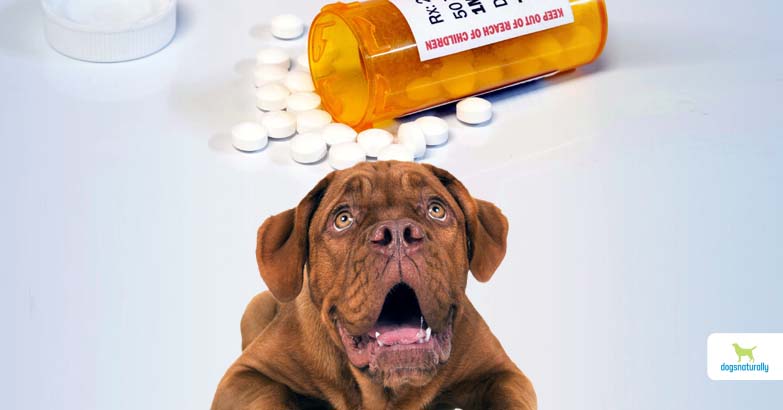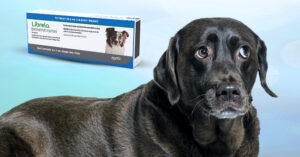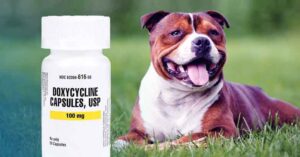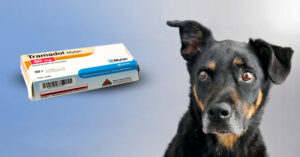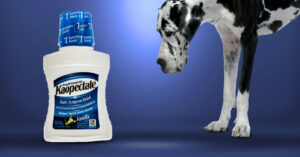Depression and anxiety are not just human conditions; animals like dogs can also suffer from them. Trazodone is a medication that is commonly prescribed to help manage these types of conditions in both humans and dogs.
It is an antidepressant drug commonly used to treat depression, anxiety, and other behavioral issues in dogs. However, these medicines come with several side effects like gastrointestinal upset (eg nausea, vomiting), increased drowsiness and sedation, tremors or shakes, changes in appetite, and increased heart rate.
This article will discuss the side effects of trazodone for dogs and some natural alternatives that may help manage depression and anxiety in your pet.
What Is Trazodone for Dogs?
Trazodone (also sold under the brand names Desyrel and Oleptro) is an antidepressant medication that belongs to a class of drugs known as serotonin modulators. It affects serotonin levels, a neurotransmitter in the brain that plays a role in regulating mood.
By increasing serotonin levels, trazodone can help improve your dog’s mood and reduce anxiety and behavioral problems associated with stress.
What Is Trazodone Used For In Dogs?
In 2008, Gruen and Sherman explored the effects of trazodone on 56 dogs when combined with primary behavior treatments (1). They reported that the medication delivered therapeutic benefits with minimal side effects.
A 2016 study of 120 dogs at Ohio State University College of Veterinary Medicine found that Trazodone reduced signs of stress in hospitalized patients (2).
As a result, trazodone has become a widely accepted treatment for anxiety, fear, aggression, compulsive behaviors, and noise phobia in canines. Some common uses of trazodone in dogs are
- Treats insomnia
- Promotes relaxation
- Treats noise phobias
- Post-surgical use
- Reduces aggression
- Helps with separation anxiety
Trazodone is prescribed “off-label” for dogs, meaning it’s not specifically FDA-approved for veterinary use.
Dosage Of Trazodone For Dogs
The dosage of Trazodone will vary depending on the size and weight of your dog as well as the severity of its symptoms. Generally, vets will start with a low dose and increase it gradually until the desired effect is reached.
The standard dosage for dogs is 1.7 to 19.5 mg/kg/d on a daily or as-needed basis with immediate action (not extended-release) tablets.
Side Effects of Trazodone for Dogs
Trazodone is generally considered to be safe for use in dogs and is a common antidepressant used to treat depression, anxiety, and other behavioral issues in them. This medication can be beneficial when used correctly, but it may also have some potential side effects that owners should be aware of.
Here are the most common side effects of giving trazodone to dogs.
Gastrointestinal Upset
Gastrointestinal upset is one of the most common side effects that your dog may experience when taking trazodone. You might notice nausea, vomiting, or even some diarrhea or constipation due to disruption of his gut microbiome and digestion.
Increased Drowsiness And Sedation
Relaxed nerves and muscles can lead to decreased alertness and grogginess in your dog. This is especially true if the medication has been given in higher doses or too soon before bedtime. If a dog experiences prolonged drowsiness, it may indicate that the dosage should be adjusted to avoid any further unwanted effects.
Tremors Or Seizures
Trazodone can cause tremors or seizures in some dogs due to its influence on the nervous system. It is thought that this side effect is caused by the drug’s ability to alter serotonin levels and affect neurons in the brain, which can lead to a seizure disorder.
Dilated Pupils
Trazodone can cause dilated pupils in dogs, which can indicate an underlying health issue. This is caused by the drug’s effect on the autonomic nervous system, which controls pupil dilation. It can also lead to increased sensitivity to light and other changes in vision that could potentially impair a dog’s ability to navigate.
Increased Thirst And Dry Mouth
Increased thirst and dry mouth are common side effects of trazodone use in dogs. This is due to the drug’s ability to decrease saliva production, which makes it difficult for your pup to keep its mouth moist. Additionally, the medication can cause dehydration, which can lead to an increase in thirst as your dog attempts to rehydrate his body.
Difficulty Breathing Or Shallow Respiration
Trazodone can cause difficulty breathing or shallow respiration in dogs as a side effect. This drug act on the central nervous system, slowing down the activity of nerve cells that control breathing. Additionally, it is known to partially suppress signals from the brainstem necessary for proper respiratory function. Long-term use can worsen this side effect as the body becomes less responsive to this drug.
Ataxia (Loss Of Muscle Control)
Ataxia is a loss of muscle control in dogs that can be caused by trazodone. This side effect can manifest as difficulty with balance and coordination, trembling, or confusion. The drug works by increasing serotonin activity in the brain, which can have an adverse effect on coordination and balance.
Colitis (Inflammation Of The Colon)
Trazodone can cause colitis, which is an inflammation of the colon in dogs. This is due to its ability to disrupt the balance of bacteria in the gut and alter normal digestion, which could lead to a disruption in the normal motility of stool through the digestive system. Symptoms may include diarrhea, vomiting, weight loss, lack of appetite, and abdominal pain.
Arrhythmia
Trazodone can cause arrhythmia or an abnormal heartbeat in dogs. This is due to the drug’s ability to interact with cardiac ion channels and receptors, resulting in a disruption of normal electrical conduction within the heart. It can also result from increased sympathetic nervous system activity caused by trazodone use.
Increased Aggression
Trazodone can cause increased aggression in dogs due to disrupting their natural serotonin levels. Serotonin is associated with mood and behavior, and an imbalance of this hormone can lead to various behavioral changes, including aggression.
Hyperactivity
Hyperactivity is another side effect that can manifest when giving trazodone to dogs. This heightened activity and restlessness can be caused by the medication stimulating the central nervous system, leading to increased energy levels.
In some cases, this can also lead to increased aggression or other behavioral changes due to the change in their mental state.
Priapism (Persistent And Painful Erection Of The Penis)
Priapism is a rare side effect of trazodone use in dogs and is characterized by an abnormally long-lasting, painful erection of the penis. It occurs when the blood vessels within the penis become blocked or narrowed due to increased serotonin levels. This can lead to difficulty urinating, abdominal discomfort, and general discomfort.
These are just some potential side effects of trazodone use in dogs. In some cases, long-term use of trazodone can lead to more severe side effects, such as liver or kidney damage. So it’s important to monitor your dog closely and contact your vet if anything unusual occurs.
Natural Alternatives to Trazodone
Natural alternatives are available to help manage depression and anxiety in dogs. These natural remedies include herbs, supplements, foods, and lifestyle changes that can help address the underlying causes of your pet’s mental health issues.
Herbal Remedies for Dogs
Herbal remedies can be an effective alternative to Trazodone in treating depression and anxiety in dogs. These herbs increase serotonin, dopamine, and other neurotransmitters in the brain, which can help reduce symptoms of depression and anxiety.
They also have anti-inflammatory properties that can provide additional benefits for your pet’s mental health. Additionally, many of these herbs are considered safe for long-term use, depending on the specific herb.
Here are some of the most popular herbs for dogs.
St. John’s Wort
St. John’s Wort is a herb used as a natural remedy for depression in dogs. This herb, also known as hypericum perforatum, contains key compounds that can help alleviate symptoms of mild to moderate depression and anxiety. It increases the levels of certain brain chemicals that regulate mood, such as serotonin.
Lavender
Lavender is a great natural remedy to help soothe your pup’s anxiety or insomnia. Not only does lavender smell heavenly, but its calming properties can help soothe anxious dogs and lull them into a peaceful sleep.
You can give lavender to your pup in various forms, such as tea, tincture, essential oil, or capsule. Dilute the lavender essential oil before use, as it irritates the skin.
Valerian Root
Valerian Root is an herb that has been used in traditional medicine to help treat anxiety and improve sleep quality. It is considered just as effective as more modern medications, such as trazodone, in controlling anxiety symptoms.
It can be given as dried root, tincture, capsules, or drops. The recommended dose of Valerian Root for dogs is:
- 1-7.5 grams for dried root
- 7-15 milliliters for tincture
This is the dose rate for an adult dog, and you have to start from a lower dose, gradually increase up to a high dose and observe results and signs accordingly.
Kava Kava
Kava Kava is a popular herb from the South Pacific islands that’s great for calming anxious dogs. It can be used to treat separation anxiety and fear of loud noises like thunder and fireworks or even help as an anticonvulsant, muscle relaxer, painkiller, and sleep aid.
But don’t forget: Always get your holistic vet’s approval before giving your pup Kava Kava because it can be toxic if used too much, and ask your vet for the correct dose for your dog. You’ll find it available in capsule, tablet, or liquid form and administered under veterinary supervision.
Passionflower
Passionflower is a great way to reduce your dog’s stress. Making tea from the herb and giving it to your pup is an easy and effective way of providing them with its natural benefits – plus, no more anxious pill swallowing!
Using a dropper, you can also use liquid extract and add a dose directly into your dog’s food, water, or even mouth. Here are the recommended dosages for passionflower:
- 0.25-0.5 ml for dogs under 30 lbs
- 0.5-1.0 ml for dogs of 30-60 lbs
- 1.0-2.0 ml for dogs over 60 lbs
CBD Oil
CBD oil for dogs helps your dog relax, reduce stress and even improve their sleep. Unlike marijuana, CBD products don’t contain delta-9-tetrahydrocannabinol (THC), which is the compound responsible for giving it its psychoactive effects.
Most CBD products are derived from hemp rather than marijuana – so there is no need to worry about your pup getting high! Buy a full spectrum CBD oil and follow the dosing instructions on the package.
RELATED: Helpful herbs for your dog’s anxiety …
Natural Supplements for Dogs
Supplements can be an effective alternative to Trazodone in treating depression and anxiety in dogs. Omega-3 fatty acids, such as docosahexaenoic acid (DHA) and eicosapentaenoic acid (EPA), are beneficial for mental health disorders.
These fatty acids are thought to reduce inflammation and improve neural communication in the brain, which can help reduce symptoms of depression and anxiety.
Other supplements that have been found to help dogs with anxiety and depression are discussed below.
L-5-hydroxytryptophan (5-HTP): This dietary supplement is a natural precursor to serotonin, a neurotransmitter that helps regulate mood and emotions.
S-adenosyl-L-methionine (SAMe): This supplement is thought to increase levels of serotonin and dopamine in the brain, both of which can be helpful in treating depression and anxiety.
B Vitamins: These are essential vitamins in energy production, brain function, and mood regulation. Supplementing with specific B vitamins, such as B6, B12, and folic acid can be beneficial in treating depression.
Magnesium: It helps regulate brain function and is often used to treat anxiety and insomnia. Supplementing with magnesium could reduce symptoms of anxiety.
Zinc: It’s an important mineral for many processes in the body and is thought to help regulate mood. It’s also beneficial in treating depression.
Ask your holistic veterinarian about the correct amount to give your dog for his individual needs.
RELATED: How to treat dog depression naturally …
Foods for Anxiety In Dogs
Certain foods may help manage depression and anxiety in dogs, such as probiotics and pumpkin seeds. Probiotic-rich foods like kefir, yogurt, and sauerkraut keep the gut microbiome in balance and support overall health.
Pumpkin seeds are a source of tryptophan, which is an essential amino acid that helps produce serotonin and has been linked to improved mood.
Lifestyle Changes
Finally, lifestyle changes can also be beneficial in helping manage depression and anxiety in dogs. Regular exercise and playtime with your pet and providing plenty of mental stimulation and socialization with other animals and people can help reduce the symptoms of these conditions.
Ensuring your dog gets enough sleep each night can also help improve his overall mental health.
RELATED: Benefits of melatonin for dogs …
Conclusion
Natural alternatives like herbs, supplements, foods, and lifestyle changes can be effective in helping manage depression and anxiety in dogs without the side effects associated with Trazodone.
It’s important to consult your veterinarian before starting any new supplement or herbal remedy for your pet, as some may not be safe or appropriate for your pet’s condition. Lifestyle changes should be made in consultation with a qualified animal behaviorist if necessary.
References
- Gruen ME, Sherman BL. Use of trazodone as an adjunctive agent in the treatment of canine anxiety disorders: 56 cases (1995-2007). J Am Vet Med Assoc. 2008 Dec 15;233(12):1902-7.
- Gilbert-Gregory, SE et al. Effects of trazodone on behavioral signs of stress in hospitalized dogs. JAVMA Vol 249 No. 11, December 1, 2016

